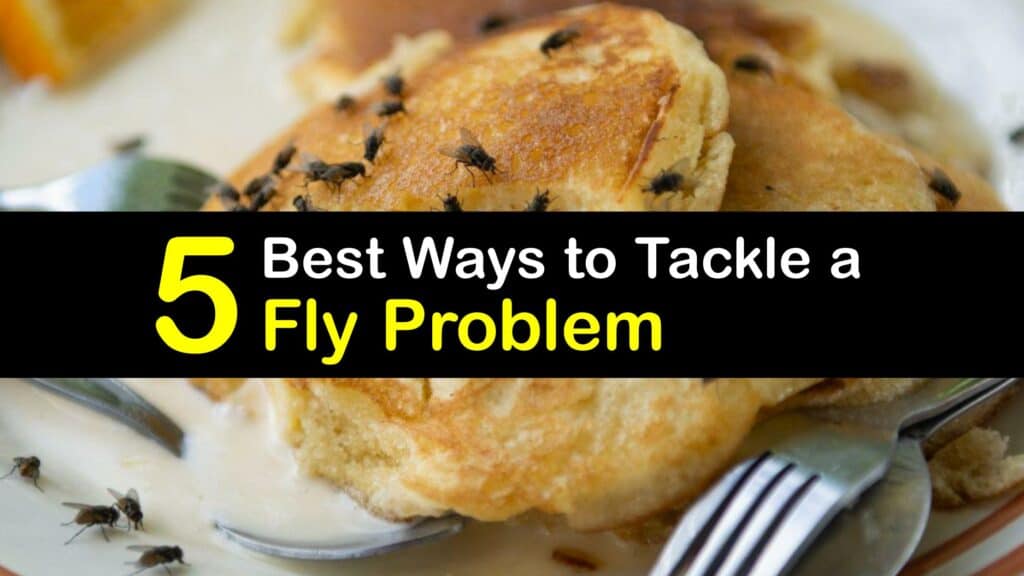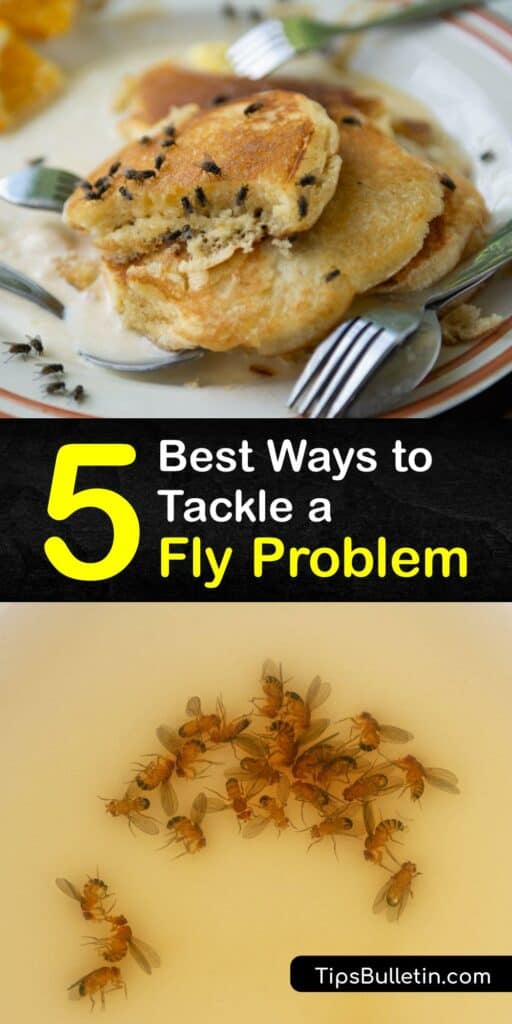Finding houseflies in your home is more than just annoying; the presence of house flies poses a health risk as flies transfer food-borne illnesses. Whether you are dealing with a common house fly infestation or other types of flies like fruit flies, it’s vital to know how to handle a fly problem, kill these pests and reduce the fly population in your house.
Other than the common house fly, the stable fly, black fly, and the cluster fly or blow fly are types of flies that pose a more direct threat. The stable fly lives around livestock, where it feeds on their blood and lays eggs in their waste. This fly also feeds on human blood and risks infecting humans with parasites. The stable fly shares this risk with cluster flies and black flies.
Dealing with a fly problem involves dealing with egg masses that the adult flies lay around your house. The difficulty in eliminating flies is that fly eggs are small and hatch quickly into fly larvae. Some fly species like the flesh fly even give birth to live maggots that immediately begin feeding, and in a few weeks, a new generation of adult flies are mating in your house.

Tips for Fly Control
We refer to many fly species as filth flies for their habit of reproducing in animal waste. These flies are drawn to decomposing organic matter like rotting fruit and other food debris in the garbage. Ridding your home of flies involves thorough cleaning and methods to kill house flies and prevent their numbers from increasing.
Creating Traps for Fly Problems
If indoor flies, such as fruit flies, are an issue in your home, create a trap to draw them in and kill them. Combine household items like apple cider vinegar, water, and liquid soap to create an enticing trap that quickly kills flies.

Leave your trap in any area with heavy fly activity or underneath houseplants if you have fungus gnats.
Fill a bowl with water before mixing in liquid dish soap and two tablespoons of apple cider vinegar. Although apple cider vinegar doesn’t have a pleasant smell, it attracts flies. Mixing water with soap lowers the surface tension, allowing flies that land on the water to fall in and drown.
Using Plants for Fly Prevention
When looking for methods of natural fly control, herbs and flowering plants are powerful methods for outdoor fly repellent. What makes plants effective against insect pests are the essential oils produced within the plant.
Leave potted plants around your home for passive protection against flies indoors. Another option for using plants that flies dislike is to include them as companion plants to protect your garden from pests like a spotted lanternfly or Mediterranean fruit fly.
Milkweed (Asclepias syriaca) exudes an organic compound when damaged that is dangerous to many animal species, including humans. After feeding on milkweed plants, this compound poisons pests like lanternflies.
Additionally, milkweed is a favorite flower for beneficial insects like monarch butterflies to visit, and adding milkweed to your garden may help with the pollination of your plants.
Plants like lavender, clove, and mint make excellent houseplants, and although humans enjoy their smell, flies do not. These plants also make great additions to the area around your home to prevent insects from entering.
Homemade Spray for a Fly Problem
Regular cleaning is crucial to managing a fly problem and destroying any breeding sites for flies. To clean your home and remove possible food sources for flies, create a home remedy to kill flies and disinfect surfaces. Use a simple cleaning spray with dish soap and rubbing alcohol to clean surfaces around your home.
Add the dish soap to a 16-ounce spray bottle before adding water and alcohol in equal parts. Shake the bottle to incorporate the ingredients. Spray in areas a fly may visit, like where food residue remains – countertops, tables, and cabinets.
Essential Oil Fly Deterrent
A homemade solution for fly prevention involves using an herb that flies do not like – basil. Although basil plants on their own do not pose much of a threat, after crushing the leaves, the scent they exude repels various pests.
Boil water and add a handful of basil leaves, allowing them to simmer for 15 minutes. Remove the pan from the heat and let it cool before adding vodka. Use a strainer to add the basil water to a spray bottle. Treat areas around your house with this spray for a natural barrier against fruit flies.
Kill Drain Flies
After rinsing dishes in the sink, small amounts of food residue end up in the drain, and despite the running water, this residue sometimes sticks to the sides of the drain. This food residue attracts flies using the drain as shelter and a breeding site.
Drain flies do not pose as much of a health threat as some other flies, but their presence is unwanted. Cleaning your drain with commercial cleaners is one method to ensure your drain is clean and free of pests. Still, a homemade solution made with vinegar is less expensive and quickly helps break down the decomposing food in the drain.
Combine salt with baking soda in a bowl before slowly adding a cup of white vinegar. Mix until well combined, and pour the mix down your kitchen sink. Bring a pot of water to a boil and pour it down the drain. Acidic vinegar helps dissolve the food, and adding boiling water helps clean out the drain and kill flies.
How to Keep Flies Away
Because flies like decomposing organic material, one of the best ways to keep flies out of your house is to manage your trash correctly. Use covered trash bins inside the house and remove the trash to outdoor garbage cans every few days.
Ensure outdoor cans are not close to windows or doors, as this increases the chance that flies find their way inside in search of additional food sources. If you find flies in your house despite covering your trash, check any fruit or vegetables you’ve left out and cover them in plastic wrap or relocate them to the refrigerator to avoid the risk of flies laying eggs on them.
Unlike other pests like bed bugs, fly infestations do not typically require professional assistance; however, in warmer months, it’s crucial to manage fly activity through regular cleaning and management of any food left out around the house.

If our guide helped you tackle an adult fly problem in your home, please share these tips on fly prevention with your friends on Facebook and Pinterest.